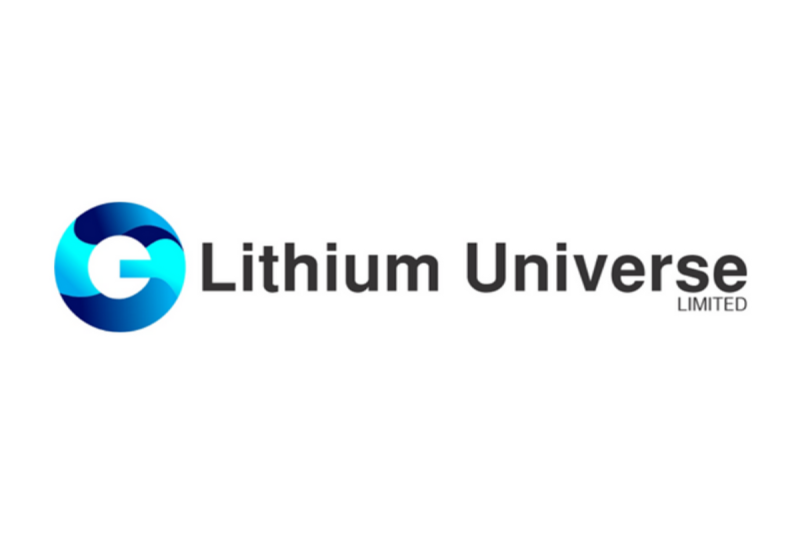
 Lithium Universe (LU7:AU) has announced MOU signed with Lafarge Canada Inc.
Lithium Universe (LU7:AU) has announced MOU signed with Lafarge Canada Inc.
Download the PDF here.

 Lithium Universe (LU7:AU) has announced MOU signed with Lafarge Canada Inc.
Lithium Universe (LU7:AU) has announced MOU signed with Lafarge Canada Inc.
Download the PDF here.
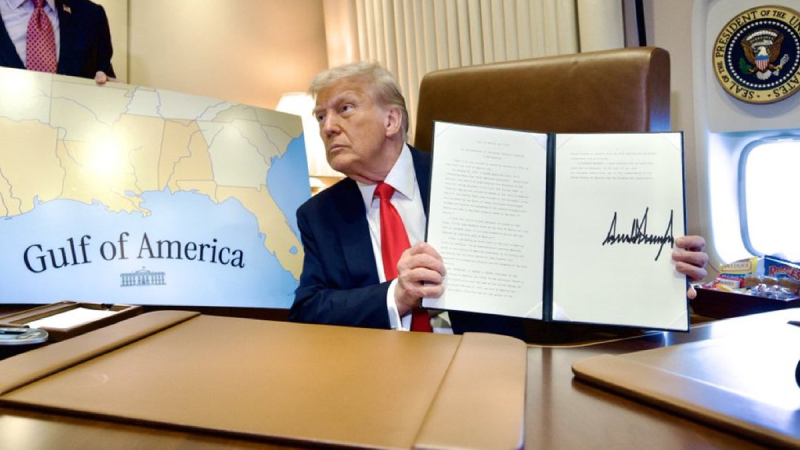
President Donald Trump signed a proclamation declaring February 9th as ‘Gulf of America Day’ as he flew over the recently renamed body of water on his way to make history at Super Bowl LIX on Sunday afternoon.
‘MOMENTS AGO ON AF1: President Trump signed a Proclamation declaring February 9th ‘Gulf of America Day’ while flying over the newly and appropriately named GULF OF AMERICA!’ White House Press Secretary Karoline Leavitt announced in a post on X.
‘Air Force One is currently in international waters, the first time in history flying over the recently renamed Gulf of America,’ the White House shared in a video on X, showing Trump signing the proclamation.
Trump signed the proclamation aboard Air Force 1, while traveling to Super Bowl LIX. He will be the first sitting president to ever attend a Super Bowl.
‘Today, I am very honored to recognize February 9, 2025, as the first ever Gulf of America Day,’ the proclamation read.
‘I took this action in part because, as stated in that Order, ‘[t]he area formerly known as the Gulf of Mexico has long been an integral asset to our once burgeoning Nation and has remained an indelible part of America.’
‘Today, I am making my first visit to the Gulf of America since its renaming,’ the proclamation continued. ‘As my Administration restores American pride in the history of American greatness, it is fitting and appropriate for our great Nation to come together and commemorate this momentous occasion and the renaming of the Gulf of America.’
Former North Dakota Gov. and current Secretary of Interior Doug Burgum also praised the president and celebrated the gulf’s official day.
‘It’s official! Congratulations @POTUS on the Gulf of America! Interior has implemented your instruction from the Executive Order on Restoring Names That Honor American Greatness,’ Burgum wrote.
‘Another big win for President Trump’s agenda to Make America Great Again.’
‘It’s official! Proclamation signed aboard Air Force 1 above the Gulf Of America!’ Trump’s son, Eric Trump, posted on X.
Trump announced his push for the name change during his first press conference as the 47th President of the United States of America.
‘We’re going to be changing the name of the Gulf of Mexico to the Gulf of America, which has a beautiful ring. That covers a lot of territory,’ Trump previously said at his first news conference. ‘The Gulf of America. What a beautiful name. And it’s appropriate.’
The changes will apply to official federal documents and maps, though it is unclear whether the order also requires schools to use the new terminology.
Trump has also pushed to rename Alaska’s Mount Denali, pointing out that it was originally named after President William McKinley.
‘McKinley was a very good, maybe a great president,’ Trump said at a December rally. ‘They took his name off Mount McKinley, right? That’s what they do to people. Now, he was a great president, very good president. At a minimum, he was a very good businessman. He was a businessman, then a governor, very successful businessman.’
Fox News Digital’s Anders Hagstrom contributed to this report.
Stepheny Price is a writer for Fox News Digital and Fox Business. Story tips and ideas can be sent to stepheny.price@fox.com
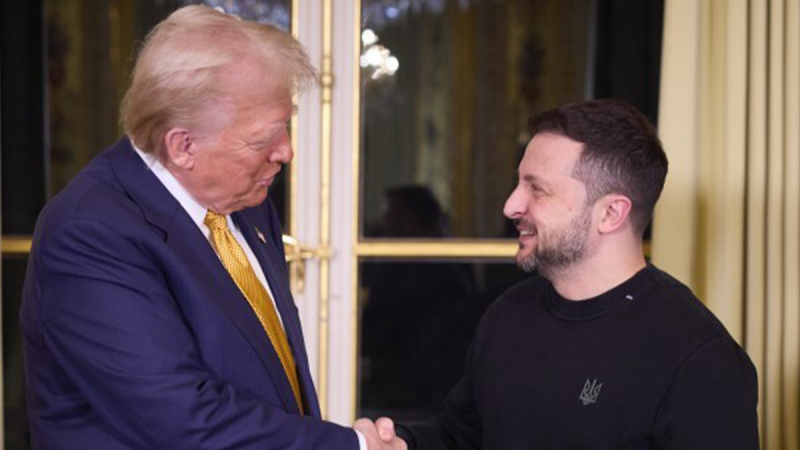
President Donald Trump kicked off his fourth week in office by attending the Super Bowl in what is expected to be another action-packed work week that could include a meeting with Ukrainian President Volodymyr Zelenskyy.
Trump will land back in Washington, D.C., late Sunday evening after attending the Super Bowl and spending the weekend at Mar-A-Lago. The 47th president hinted that he could hold his first meeting with Zelenskyy since his Jan. 20 inauguration later this week to discuss the ongoing war between Ukraine and Russia.
‘[Zelenskyy] may meet next week, yeah. Whenever he would like. I’m here,’ Trump told reporters while hosting Japanese Prime Minister Shigeru Ishiba on Friday.
Trump has already met with Israeli Prime Minister Benjamin Netanyahu, whose nation is in the midst of a ceasefire agreement with Hamas following more than a year of war, and has vowed to end the war between Russia and Ukraine. Russia invaded Ukraine in February 2022, leading to hundreds of thousands of deaths for both nations as war continues.
‘I will probably be meeting with President Zelenskyy next week. And I’ve… I will probably be talking to President Putin. I’d like to see that war end for one primary reason: They’re killing so many people,’ Trump said during the press conference on Friday.
Trump last met with Zelenskyy when he was president-elect in December during a trip to Paris ahead of the Notre Dame Cathedral reopening after a fire ripped through the Catholic church in 2019.
‘You have 8 or 900,000 Russian soldiers are dead, and very badly wounded. And the same thing with Ukraine, you have probably 700,000 with Ukraine. The numbers they gave are a little bit lower than that. But I believe those numbers aren’t correct. I’d like to see it just on a human basis. It’s terrible what’s going on,’ Trump added of the ongoing war during his comments Friday.
Trump confirmed to the New York Post on Friday that he has spoken to Vladimir Putin as the war continues, but did not divulge many details beyond that Putin ‘wants to see people stop dying.’
Trump suggested earlier last week that Ukraine should strike a deal with the U.S. to provide crucial minerals – such as titanium, lithium, graphite and uranium – in exchange for military aid.
‘We’re putting in hundreds of billions of dollars. They have great rare earths. And I want security of the rare earth, and they’re willing to do [that],’ Trump told reporters at the White House last Monday.
Zelenskyy told the media a day later that he is open to an ‘investment’ from ‘partners who help us defend our land and push the enemy back with their weapons, their presence, and sanctions packages.’
‘And this is absolutely fair,’ he added.
Trump is also expected to meet with the CEO of Nippon Steel this week, which is Japan’s largest steel company. The Biden administration had blocked a nearly $15 billion deal for the Japanese company to buy the American steelmaker, U.S. Steel, with Trump previewing last week that Nippon is now looking to invest in U.S. Steel as opposed to purchasing it.
Nippon Steel ‘is going to be doing something very exciting about U.S. Steel,’ Trump said on Friday. ‘They’ll be looking at an investment rather than a purchase.’
‘Very great company and they’ll work out the details,’ Trump said of Nippon, mistakenly referring to it as ‘Nissan,’ a Japanese car company on first reference. ‘I’ll help. I’ll be there to mediate and arbitrate.’
The president is in the midst of leveraging tariffs on Canada, Mexico and China to bolster border security, end illegal immigration and stem the flow of fentanyl into the U.S. Trump previewed on Friday that this week will include him announcing ‘reciprocal trade’ tariffs on other nations, as opposed to a flat 10% or 20% tariff on other nations, as he has previously threatened.
‘I’ll be announcing that next week, reciprocal trade, so that we’re treated evenly with other countries,’ he told reporters on Friday, saying the announcement should come by Monday or Tuesday. ‘We don’t want any more, any less.’
‘I think that’s the only fair way to do it that way nobody’s hurt,’ the president continued. ‘They charge us, we charge them. It’s the same thing, and I seem to be going in that line as opposed to a flat fee tariff.’
In addition to anticipated foreign relations and international trade announcements and meetings, Trump’s administration is expected to continue its investigations of the federal government’s various agencies as part of the Department of Government Efficiency’s quest to suss out internal corruption and government overspending.
Trump’s schedule for the week was not yet released as of Sunday afternoon, beyond attending the Super Bowl before flying back to the White House late Sunday evening.
Fox News Digital’s Morgan Phillips contributed to this article.
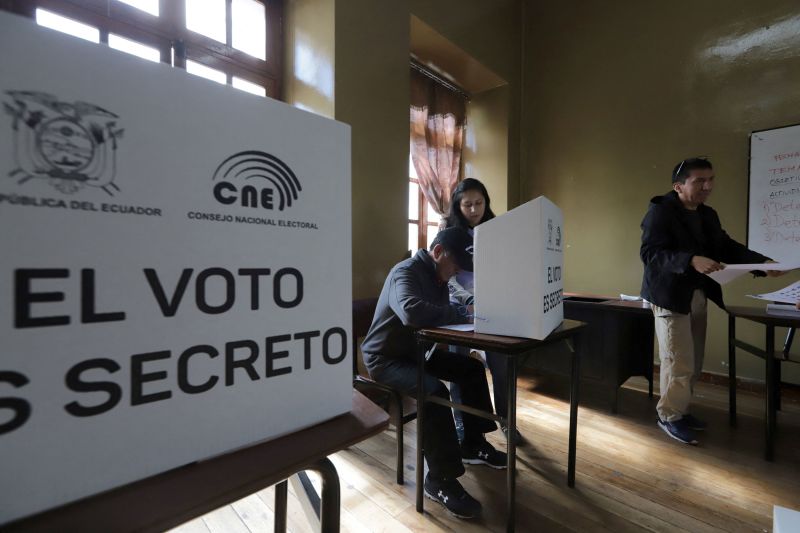
Polls have closed and votes are now being counted in Ecuador’s general election, where 16 candidates are vying for the presidency, including incumbent Daniel Noboa and his main political rival Luisa González.
According to Ecuador’s Constitution, a candidate needs more than 50% of the vote to win the first round outright, or 40% with a margin of at least 10 percentage points over the next closest candidate.
If these conditions are not met, the two candidates with the most votes will face each other in a second round, which is provisionally scheduled for April 13.
Sunday’s vote will decide if the country will stick with Noboa’s tough crackdown on crime or seek an alternative voice in González.
Noboa, who won the 2023 snap election to finish the term of his predecessor Guillermo Lasso, has presided over a series of crises in his term.
He has declared numerous states of emergency, deployed military units to tackle gang activity in the country’s streets, and began construction on a new maximum-security prison after an infamous criminal leader escaped from custody last year.
González, who was the runner-up in the 2023 race, is a close confidante of former leftist President Rafael Correa, a dominant figure in Ecuador’s politics.
Running on a campaign to “Revive Ecuador,” González has pledged to tackle the drug trade just as vigorously as Noboa.
The main challenges the next government will face when it takes office in May are security, the economy, a nationwide energy crisis and international relations.
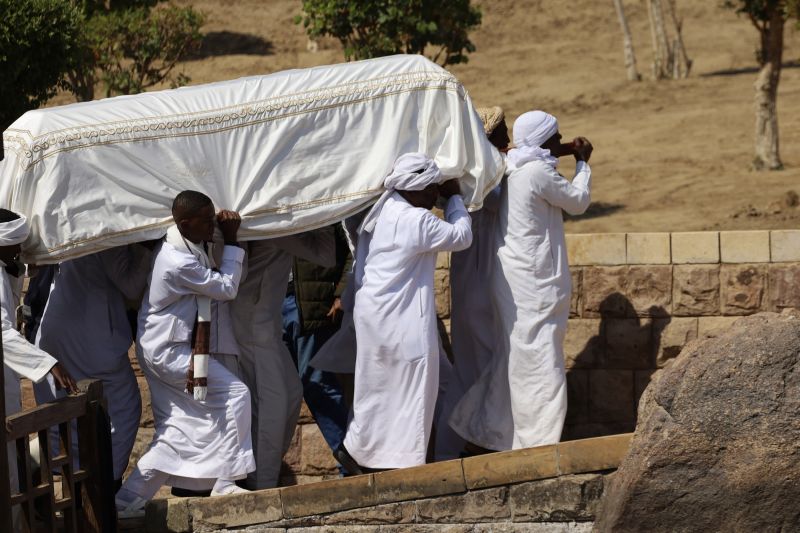
The Aga Khan IV was laid to rest on Sunday at a private ceremony in Aswan, Egypt.
The death of Prince Karim – the 49th hereditary imam of the Shiite Ismaili Muslims – was announced Tuesday by the Aga Khan Development Network and the Ismaili religious community. His son, 53-year-old Rahim Al-Hussaini, has been named as the Aga Khan V, the spiritual leader of the world’s millions of Ismaili Muslims, in according with his father’s will.
On Saturday, a private funeral service took place at the Ismaili community center in Lisbon attended by Canadian Prime Minister Justin Trudeau, Spain’s King Emeritus Juan Carlos and Portugal’s President Marcelo Rebelo de Sousa.
The Aga Khan is considered by his followers to be a direct descendant of the Prophet Muhammad and is treated as a head of state.
The governor of Aswan welcomed Prince Karim’s family at the southern Egyptian’s provinces airport on Saturday.
“When his will was opened, it was found that he had requested to be buried in Aswan near his grandfather, Sultan Muhammad Shah, and his grandmother, Om Habiba,” said Maj. Gen. Ismail Kamal.
Ismaili mourners marched as bells rang during the burial ceremony in the country’s southern Aswan province, as Prince Karim’s body was taken in a van.
They carried his body, draped in a white shroud, and placed it on a yacht on the Nile River.
Prince Karim, 88, was given the title of “His Highness” by Queen Elizabeth in July 1957, two weeks after his grandfather, the Aga Khan III, unexpectedly made him heir to the family’s 1,300-year dynasty as leader of the Ismaili Muslim sect.
The late Aga Khan evolved over decades into a business magnate and a philanthropist, moving between the spiritual and the worldly with ease.
He was a defender of Islamic culture and values, but also widely regarded as a builder of bridges between Muslim societies and the West.
The Aga Khan Development Network deals mainly with issues of health care, housing, education and rural economic development.
It says it works in over 30 countries and has an annual budget of about $1 billion for nonprofit development activities.
Ismailis lived for many generations in Iran, Syria and South Asia before also settling in east Africa, Central Asia and the Middle East, as well as Europe, North America and Australia more recently.
They consider it a duty to donate up to 12.5% of their income to the Aga Khan as steward.

Two rare black wolves, likely siblings, were spotted on camera crossing a stream in a Polish forest, a conservation organization said Sunday.
The unusual sighting, captured last year on a video camera set up by SAVE Wildlife Conservation Fund Poland project coordinator Joanna Toczydłowska, has prompted the organization to collect scat (droppings) in the forest in the hopes of learning more about the black wolves’ genetics.
“It’s something new and unusual,” Toczydłowska told The Associated Press.
Toczydłowska initially placed the camera to study beavers. When she noticed she was recording wolves instead, she kept the camera there and collected the black wolf footage a few weeks ago.
In one clip, a black wolf and a gray wolf slowly crossed a stream in the forest, the water nearly up to their bellies, before they leap onto the bank. A second clip, taken last fall, records two black wolves and a gray wolf fording the same stream.
Most of the 2,500 to 3,000 wolves in Poland are gray with red or black accents. Black fur comes from a genetic mutation that was likely in domesticated dogs thousands of years ago. The dark fur is rare in Europe due to a reduced genetic diversity, but at least half of the wolf population has black fur in Yellowstone National Park in the United States.
Because wolves travel in families and both black wolves were around 30 kilograms (66 lbs) — roughly the size of a German shepherd — Toczydłowska said they were likely siblings and roughly a year old. At least one is male.
The conservation organization, which has been monitoring wolves in Poland for 13 years, is not disclosing the forest’s location to keep the wolves safe from poaching and prevent misinformation about wolves from spreading.
Wolves were essentially extinct in Poland by the 1950s, but the population has returned in recent years, especially in central part of the country in the early 2000s. Toczydłowska and her colleagues teach other the public how to safely live in areas inhabited by wolfpacks.
“For people, it is a new phenomenon,” Roman Gula, head of the organization’s wolf monitoring project, told the AP. “Education is one of our major, major goals.”
The conservation fund announced the sighting last week on Facebook and asked for financial support to pay for the scat’s genetic testing to learn more about the black-fur mutation.

The families of the three Israeli hostages released Saturday have spoken out about their loved ones’ ordeal in Hamas captivity, saying they hope their suffering provides impetus to efforts to free all those still in Gaza as soon as possible.
Ohad Ben Ami, Eli Sharabi and Or Levy appeared gaunt and frail as they were paraded by the militants on a makeshift stage in Gaza before they were handed over to the Red Cross.
Their appearance was condemned as “shocking” by Israel, which has said the scenes will “not go unaddressed.”
Ella Ben Ami, daughter of Ohad, spoke of her horror at watching Hamas parade her father on the stage.
“I had many pictures in my mind of my dad, but nothing prepared me for those pictures of him on that stage in Gaza. I was sure that I would be strong, but I fell on the floor and screamed, ‘I’m sorry,’” she said.
Speaking at a press conference on Sunday, Ella Ben Ami said her father “went through hell” in Gaza and noted that the remaining Israeli hostages are suffering the same conditions her father did.
She called on the Israeli government and Prime Minister Benjamin Netanyahu to “find a way” to bring them all home.
“We have to keep going to Phase B, and have to bring everybody back,” she said referring to the second phase of the Israel-Hamas ceasefire deal, which is supposed to see the return of the remaining hostages and was expected to be discussed in a “a security-political cabinet meeting” held by Netanyahu this weekend.
Or Levy’s brother Michael said when he saw his brother on Saturday for the first time in 16 months, he wasn’t the same person who left home on October 7, 2023.
“He came back in poor physical condition. Anyone who saw the pictures and videos couldn’t ignore it. For 16 months, he was hungry, barefoot and in constant fear that every day can be his last,” Michael said, according to the Hostages Families Forum Headquarters.
After his release, Or received the heartbreaking news that his wife Einav had been killed in the October 7 attack.
“The hardest blow was yesterday when Or discovered that Einav, the love of his life, was murdered on that terrible day. For 491 days, he held onto hope that he would return to her,” Michael said.
He went on to call for the immediate release of the remaining hostages, saying, “Or’s return is a miracle, but we can’t rest until every single one of them is back with their families.”
Eli Sharabi’s brother Sharon described the return of the three hostages as a victory for the Israeli people but said the government must work with a sense of urgency to save the other hostages, the Hostages Families Forum Headquarters said.
Yossi, another brother in the family, was also taken hostage by Hamas but he subsequently died in Gaza.
“Every moment that passes, every second could save lives from Hamas tunnels, from this cruel enemy that has massacred us since October 7,” Sharon said.
Hamas has now released a total of 16 Israeli hostages as part of the first phase of the ceasefire agreement, of a total of 33 promised at staggered intervals during this stage. Eight of those 33 are dead, according to the Israeli government.
Following the release of the three hostages on Saturday, Hamas and its allies still hold a total of 73 people taken from Israel on October 7, 2023, of 251 initially taken. Three additional hostages, held captive since 2014, are still in Gaza.
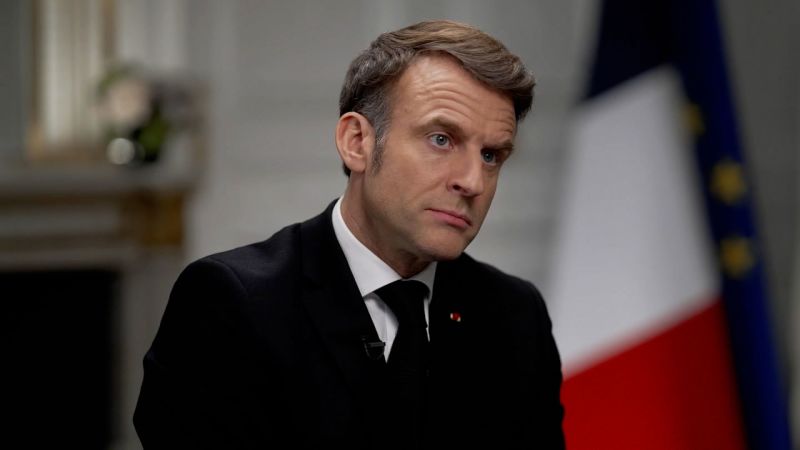
For a man who’s spent his career battling to make France more pro-business, Europe’s prospects on artificial intelligence are worrying: an oversight that could cost the bloc dearly.
“We need an AI agenda,” he said, “because we have to bridge the gap with the United States and China on AI.” The French leader added that he fears Europe becoming merely an AI consumer, losing control over the future direction and development of the technology.
That’s part of the impetus behind this week’s AI summit in Paris — the latest effort by Macron to put France at the heart of the debate and decision-making on international questions of the day.
Macron regularly touts the prospects of Paris-based company Mistral, widely considered OpenAI’s European competitor, which launched a new app on Thursday.
The company boasts of its ability to rival its US competitors, by getting the same results with less computing power needed, although the surprise arrival of lower-cost Chinese competitor DeepSeek has put pressure on the French firm.
With its nuclear-heavy energy portfolio making France a net energy exporter, the country is in an enviable position for the creation of power-ravenous data centers.
France is set to unveil what its government boasts is Europe’s largest supercomputer by fall 2025, outside Paris.
The Mont Valerien site will be a military facility, bringing AI capabilities at scale to help solve design and engineering questions, like the architecture of France’s next aircraft carriers. AI will also be used to improve future military technologies and practices, like anti-drone jamming, according to the French Ministry of Defense.
That’s the exception. With Europe holding a mere 3-5% of global computing power, Macron said he hopes this surplus power will open doors to Europe’s AI future. He has his sights on building 20% of the world’s data centers.
But financing — especially from the United States and the Gulf Arab states — will be key, according to Macron.
It’s where Europe “must do much better,” Macron said.
Finding cash within the continent could be an unwitting boon if President Donald Trump’s tariff threats against European allies come to a head.
“From the standpoint of America, the EU treats us very, very unfairly, very badly,” Trump told the World Economic Forum in January, later threatening to levy tariffs against the bloc after slapping — and then rescinding — stiff import taxes on Canada and Mexico.
Trump’s 10% across-the-board tariffs on China still went into effect, and the president said he will announce new so-called reciprocal tariffs next week that could hit all corners of the world.
Trump has railed against the US trade deficit with the European Union, which increased by $26.9 billion to $235.6 billion in 2024, according to US government figures.
Macron pushed back against this, arguing the trade deficit ignores Europe’s significant spending on digital services, which is often excluded from such calculations.
In response to potential tariffs, Macron said Europe must look to protect producers against American and Chinese competition and, crucially, ease regulation on investments to stem the “leaking” of European savings to the United States. EU Commission President Ursula von der Leyen mirrored that resolute stance last week.
“I will fight for AI,” he said, calling for a business environment that makes Europe more competitive. “I will fight for more defence and security answers as Europeans. And I will fight for the maximum level of ambition on all these issues.”
February and March will bring announcements and a roadmap of reforms around AI startup regulations, Macron said, in an effort to rival the United States and China’s AI agenda.
“We have to focus on killing some crazy regulations, simplification of the current environment,” Macron said. “Europe has to simplify its rules, make it much more business friendly and synchronize with the United States.”
He hopes, for AI at least, this week’s summit will be a “wake up call” for Europe.

JOHANNESBURG — President Donald Trump’s executive order penalizing South Africa released on Friday has hit a raw nerve in the African nation. The order primarily aimed at land seizures comes as Pretoria has faced ongoing U.S. criticisms that it has operated against U.S. interests, including its support of the Palestinians in the International Criminal Court and its warm relations with China, Russia and Iran.
Friday’s executive order stated in part, ‘In shocking disregard of its citizens’ rights, the Republic of South Africa recently enacted Expropriation Act 13 of 2024, to enable the government of South Africa to seize ethnic minority Afrikaners’ agricultural property without compensation.’
‘It is the policy of the United States that, as long as South Africa continues these unjust and immoral practices that harm our Nation:
(a) the United States shall not provide aid or assistance to South Africa; and
(b) the United States shall promote the resettlement of Afrikaner refugees escaping government-sponsored race-based discrimination, including racially discriminatory property confiscation.’
Friday’s executive order pointedly took aim at Pretoria’s foreign policy: ‘South Africa has taken aggressive positions towards the United States and its allies, including accusing Israel, not Hamas, of genocide in the International Court of Justice, and reinvigorating its relations with Iran to develop commercial, military, and nuclear arrangements … The United States cannot support the government of South Africa’s commission of rights violations in its country or its undermining United States foreign policy, which poses national security threats to our Nation, our allies, our African partners, and our interests.’
On Saturday the South African government responded, ‘It is of great concern that the foundational premise of this order lacks factual accuracy and fails to recognize South Africa’s profound and painful history of colonialism and apartheid,’ Chrispin Phiri, spokesperson for the country’s International Relations Department, posted on X.
Phiri added that ‘we are concerned by what seems to be a campaign of misinformation and propaganda aimed at misrepresenting our great nation. It is disappointing to observe that such narratives seem to have found favor among decision-makers in the United States of America.’
Although it lost its majority in last year’s elections, the African National Congress (ANC) is still the main party in South Africa’s present government of national unity. The party’s secretary general reacted to the offer that White Afrikaners can go become U.S. citizens by posting a photo on X. In it, a black man is standing by an open door and gesturing with both arms outside the door, suggesting Afrikaners should leave.
The government has claimed Whites of all backgrounds, not just Afrikaners, still own approximately 70% of South Africa’s land. The government is on record saying the Expropriation Act will only be used to take land needed for public purposes – such as for a new school – from people of any color when the owner refuses to sell, and even then there would be ‘fair and equitable compensation.’
Emma Powell, the international relations spokesperson for South Africa’s main opposition party, the Democratic Alliance, told Fox News Digital that ‘for decades, the DA has opposed the ANC’s race-based policies. These policies have benefited the political elite while the vast majority of South Africans continue to languish in poverty.’
She continued that the DA ‘will be pursuing legal action to safeguard property rights. It is now time for the ANC to re-evaluate both their domestic and foreign policy positions, which actively undermine our national interests.’
Powell told Fox News Digital, her party will send ‘a high-level delegation to Washington D.C. in coming weeks to engage with decision-makers. The DA remains committed to protecting private property rights, fostering economic growth, and strengthening diplomatic ties with the U.S.’
Afrikaners, descendants of predominantly Dutch settlers who landed in Southern Africa in 1652, became the country’s rulers and are widely believed to have developed the apartheid system that separated Whites and Blacks, treating Blacks as second-class citizens.
In a statement released on Saturday, AfriForum, a civil rights group that largely represents Afrikaners, expressed ‘great appreciation’ for Trump’s action, which it said was ‘a direct result of President Cyril Ramaphosa and his government’s irresponsible actions and policies.’
It continued, ‘However, the civil rights organization and its sister institutions in the Solidarity Movement remain committed to Afrikaners’ future at the southern tip of Africa and insist that urgent solutions must therefore be found for the injustices committed by the South African government against Afrikaners and other cultural communities in the country.’
One of the more outspoken and extreme members of the government of national unity, Julius Malema, head of the South African minority party Economic Freedom Fighters, said on X, ‘In light of the aggression by the USA against South Africa, we must as a nation seriously consider strengthening ties with Russia, China and nations who belong to (the international trade body) BRICS to avoid unnecessary confrontations with maniacs such as Donald Trump.’
Malema has been taken to court on hate crime charges. In one instance, he sang the genocidal anti-apartheid struggle song ‘Kill the Boer, the farmer,’ referring to the White descendants of Dutch settlers or ‘Boers’ in South Africa.